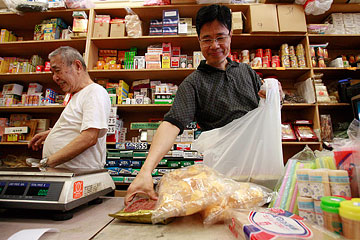 CINDY ELLEN RUSSELL / CRUSSELL@STARBULLETIN.COMDanny Au reviewed paperwork yesterday at his family-run grocery store, Bo Wah Trading Co., in Chinatown. Business is down for some Chinatown stores because of tainted Chinese products that have been imported to America. CLICK FOR LARGE |
|
Food scandal also claims Chinatown merchants
China's food-safety ills afflict local merchants
STORY SUMMARY »
Some Chinatown businesses are seeing a downturn in sales in the wake of food-safety concerns in China.
The state Health Department released a warning this month to Hawaii consumers to avoid buying toothpaste labeled as made in China, and the U.S. Food and Drug Administration has issued other public warnings about tainted Chinese food products.
The issue has put doubt in the minds of some patrons of longtime Chinatown businesses, some of which have seen sales decrease up to 40 percent, according to the president of the Hong Kong China Hawaii Chamber of Commerce.
Local business leaders are in the process of determining the extent of the reported downturn and what should be done to help.
STAR-BULLETIN
FULL STORY »
Some Chinatown businesses say public fears over the safety of Chinese products are cutting into their profits.
Retail sales at Bo Wah Trading Co., which sells Chinese dry goods and porcelain, have fallen 30 percent over last year, said owner Danny Au, who attributes the decrease to consumer fears of products imported from the country.
"A lot of people come to my store and ask me, 'Are these stuff made in China? If they're made in China, I'm not going to buy,'" he said, adding that his wholesale business on Maunakea Street is down another 20 percent. "They see in the newspapers all the negative talk about Chinese products. It causes the people not to buy Chinese stuff."
The state Health Department released a warning this month to Hawaii consumers to avoid buying toothpaste labeled as made in China, and the U.S. Food and Drug Administration has issued other warnings about Chinese food products.
"There's a reason why consumers are maybe hesitating, but that's the public's choice," said Janice Okubo, state Health Department spokeswoman.
The issue is drawing concern from Chinese business leaders, who are attempting to counter the negative publicity and downturn in local business.
 CINDY ELLEN RUSSELL / CRUSSELL@STARBULLETIN.COMSammy Au and his father, Tin Yeu Au, helped customers yesterday at the family's Bo Wah Trading Co. in Chinatown. An estimated 90 percent of the store's goods are from China. CLICK FOR LARGE |
|
Johnson Choi, president of the Hong Kong China Hawaii Chamber of Commerce, said he surveyed at least a dozen Chinatown merchants in the past week, who said the issue has resulted in a 30 to 40 percent drop in sales.
He sent an e-mail yesterday to local business leaders urging them to unite to help local Chinese businesses and is trying to get the message out to his 250 chamber members.
"What we're trying to explain to the local community in Hawaii is that there are actions that have been taken by the Chinese government and that all exports from now on (do) meet international standards," he said.
Jim Tollefson, president and CEO of the Chamber of Commerce of Hawaii, and Edward Pei, president of the Chinese Chamber of Commerce, both said the e-mail was the first time they had heard of a reported downturn among Chinatown businesses.
"We're not sure how we can help at this stage, but certainly we are concerned if there has been a slippage in their sales," Pei said. "We're kind of in the fact-finding mode seeing if this is in fact a sales pattern that is of concern to merchants in Chinatown."
A representative from the Chinatown Merchants Association wanted to do more research on the issue before publicly commenting.
Meanwhile, some other businesses say the negative publicity surrounding Chinese products has had little to no effect on sales.
"We have lots of customers always saying they're scared of Chinese products ... but they're still buying," said C.K. Wong, owner of Kwong Tong Chong Co., which has sold Chinese dry goods on Maunakea Street for more than 30 years.
However, business has dropped between 5 and 7 percent for Shirley Ing, owner of Sun Chong Co., another Chinese grocer on North Hotel Street, though July is typically a slow month for the store.
"I don't hurt that much, maybe because my store is small," she said. "I've been telling (customers) sometimes the news is not true, you don't have to believe it."
While the Empress Restaurant on North Beretania Street has seen lower sales of about 10 percent this summer compared with last year, it is likely due to more competition in the neighborhood rather than the safety concerns of Chinese food products, said owner Kenneth Lee.
"Something like that is not necessarily a bad thing -- at least it raises people's awareness of food safety," he said. "I would not be surprised if it affects (retailers) more because people are actually reading the label on the shelf, whereas people who come to our restaurant don't see what kind of canned goods we put in ingredients that goes into the preparation process."

